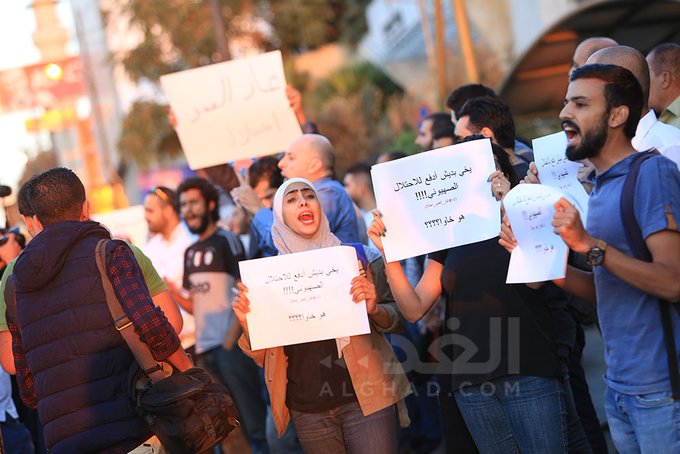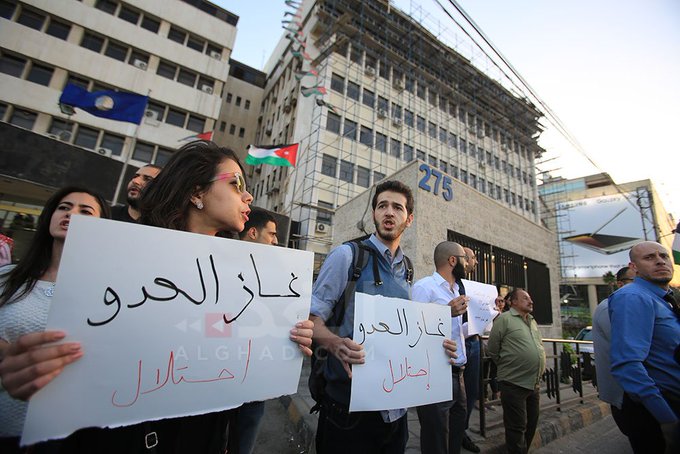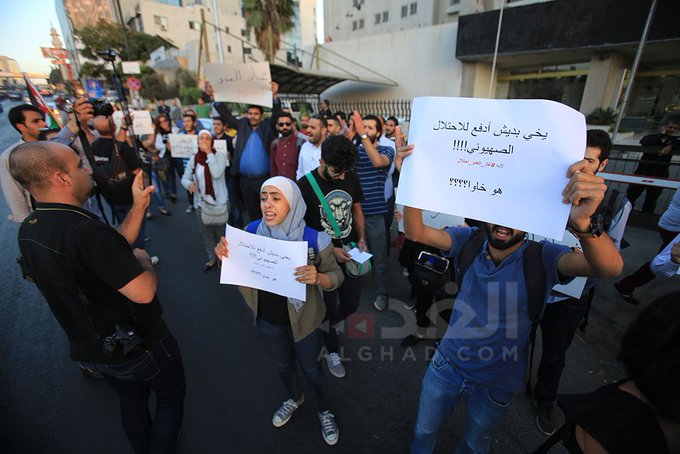A Brief Colonial History Of Ceylon(SriLanka)
Sri Lanka: One Island Two Nations
A Brief Colonial History Of Ceylon(SriLanka)
Sri Lanka: One Island Two Nations
(Full Story)
Search This Blog
Back to 500BC.
==========================
Thiranjala Weerasinghe sj.- One Island Two Nations
?????????????????????????????????????????????????Friday, September 30, 2016
Jordanians demand scrapping of $10 billion gas deal with Israel
 Ali Abunimah -29 September 2016
Ali Abunimah -29 September 2016A protester against Israel-Jordan energy deal wears a T-shirt with the slogan “the enemy’s gas is an occupation.” (via Twitter)

Jordanians will rally in downtown Amman on Friday to protest a $10 billion deal signed this week by thegovernment-owned electricity company to buy Israeli-supplied natural gas.
Demonstrations are being planned in other cities, backedby a coalition of parties and groupings from across Jordan’s political spectrum.
“Signing this agreement blatantly ignores the will of the Jordanian
people who principally and unequivocally rejected the agreement through
two years of demonstrations across the country, national petitions
signed by Jordanians and their political parties, trade unions and civil
society organizations,” Jordan BDS, a group that backs the Palestinian boycott, divestment and sanctions movement, said on Wednesday.
After news of the signing broke, Jordanians took to the street outside
the electricity company headquarters on Tuesday to protest the deal:
On Thursday, students at the University of Jordan in Amman held a large rally against the deal
— mohammad abo alads (@abo_alads) 29 September 2016
The Islamic Action Front has also urged the government to cancel the deal. Affiliated to the Muslim Brotherhood, the Islamic Action Front and its allies won 15 seats in Jordan’s parliamentary elections earlier this month, a strong showing after the group had boycotted the polls for a decade.
The vast majority of
members of Jordan’s previous parliament had expressed opposition to a
deal. But the legislature has little power to check government policy.
“The government completely disregarded the wishes of the Jordanian
people whose representatives in parliament voted in an overwhelming
majority in December 2014 to reject the deal,” Jordan BDS said.
Despite the years of organized opposition, the final agreement was signed this week by US-based Noble Energy, which will extract the Israeli-controlled gas, and Jordan’s National Electric Power Company.
Within about three years, gas is expected to start flowing from the so-called Leviathan field
in the Eastern Mediterranean, one of a number of major gas finds that
are disputed between Israel, on the one hand, and the Palestinians and Lebanon, on the other.
US pressure
The administration of US President Barack Obama has actively promoted Noble Energy’s partnership with Israel’s Delek Group to extract the gas. The partnership has been forged despite concerns that it would create apowerful monopoly, inflating prices charged to industry and consumers.
The US has also exerted pressure on Jordan to buy Israeli-supplied gas,
under the pretext that such agreements promote regional cooperation and
peace.
Hillary Clinton raised the matter directly with Jordan’s King Abdullah when she was secretary of state in 2011,according to The New York Times.
Former US president Bill Clinton has also reportedly lobbied for the interests of Noble Energy in Israel.
Noble Energy, which lobbied the State Department while Hillary Clinton was in charge there, is also a major donor to the Clinton Foundation.
In the wake of the US efforts, Noble Energy struck deals with two major
Jordanian mining companies to buy $500 million worth of Israeli-supplied
gas.
According to The New York Times, these sales “paved the way” for the $10 billion deal that has just been finalized.
Gas deals all round
Human rights defenders have charged that
Israel’s ongoing maritime blockade of Gaza is motivated by a desire to
exploit the gas fields, while depriving Palestinians of the opportunity
to extract resources off their shores themselves.
Former UK prime minister Tony Blair has been heavily involved in lobbying to ensure that UK and Israeli firms may exploit the Gaza gas.
Meanwhile, Turkey’s normalization of ties with Israel – which came after Ankara dropped its demand that the blockade of Gaza be lifted – is widely seen as a prelude to gas deals between the two countries.
Egyptian gas has been flowing to Israel for years, under deals that
enriched a tiny minority while depriving the Egyptian people of
billions of dollars in revenue by selling to Israel at below market
prices.
The regime of Abdulfattah-al-Sisi, the army general who came to power in a military coup in Cairo in 2013, iscurrently negotiating a multi-billion dollar deal to buy Israeli-supplied gas, despite the fact that Egypt itselfpossesses vast resources and until recently was a net exporter.
Undermining BDS
Last year, Palestinian campaigners welcomed a decision by the Palestinian Authority to
cancel a $1.2 billion deal to buy Israeli-supplied gas. They had hoped
that this would put pressure on Jordan not go ahead with its own deal.
The Jordanian electricity company claims the purchase agreement from Israel will save cash-strapped Jordan $600 million a year.
Campaigners reject the agreement on principle, but are also challenging the economic arguments.
“We question the wisdom behind depriving the Jordanian labor market of
job opportunities that $10 billion marked for Israel in this agreement
could create for Jordanians who are suffering from poverty and
struggling to secure their livelihoods in an already burdened economy,”
Jordan BDS said.
Jordanian experts have also asserted that the deal is politically
motivated and makes little economic sense. Among them, economist Qasim
al-Hammouri told the newspaper al-Ghad that
Jordan had better options, including developing alternative energy,
importing liquefied natural gas and domestic exploration.
Former energy minister Muhammad Batayneh also questioned the terms of the deal, saying Israel would be the main beneficiary.
Bahjat Tabbara, a letter writer in the The Jordan Times newspaper, expressed concern that the deal would undermine the global movement for Palestinian rights.
“While most of the world is joining the boycott, divest and sanctions
movement to end Israeli occupation, Jordan’s purchase of Israeli natural
gas is an anomaly,” Tabbara wrote.
“How could anyone be expected to join the BDS movement when the Arab
country closest to the Palestinians geographically and culturally is its
largest energy export market?”
Social media users have been expressing their opposition to the deal with the hashtag #غاز _ العدو _ احتلال – the enemy’s gas is an occupation.






